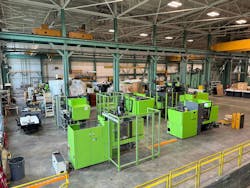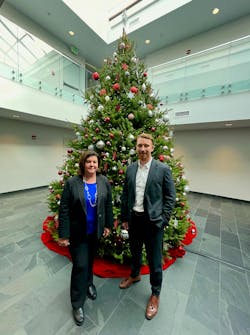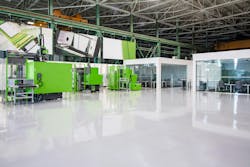By Ron Shinn
Despite a worldwide slump in injection molding machinery sales, market leader Engel GmbH has experienced good sales and increased market share. What’s the secret?
“Engel is a family-owned business,” said Vanessa Malena, president of Engel Americas. “When it comes to continuous improvement, we really invest in the company. The family’s investment volume is at least $500 million over [the last] five-year span, and then R&D is about $70 million every year.
“Whether it is for sustainability, recycling or energy-saving equipment, they are putting their money into the future Engel,” Malena said.
The formula appears to be working. Austrian-based Engel once built injection molding machines in Canada and York, Pa., but stopped at both locations by 2010. Now it has 10 production sites worldwide, including York, where automation equipment is built, and a new injection molding and automation plant in Querétaro, Mexico. Headquarters for the Americas business unit is in York.
Worldwide sales for the most recent fiscal year ended March 31 were $1.7 billion, down just 6 percent from the previous year in a market some industry associations estimated to be down by as much as 40 percent. Approximately 51 percent of Engel’s sales are in Europe and 31 percent in the Americas.
Although specific figures are not released, Engel is widely believed to be the market leader in North America in terms of sales.
Malena, who joined the York operation in 2017 and became its president in 2022, stressed the stability of being a family-owned company. “I think that's a very critical part of our DNA. In this day and age of every company buying every other company, we continue to be family-owned and run by the fourth generation of the original inventor of Engel.
“And with that, we feel very strongly with families first,” she said during a recent interview at the York headquarters. “So, our motto is to be the first, but it's also family first, and you feel that in this building. Even though we've grown quite a bit, it's still a very tight-knit organization.”
The York facility serves as headquarters for the Americas. It houses a tech center for showcasing molding machines and conducting machine and automation runoffs, one training center for customers and another for service technicians, storage for stock machinery, a spare parts hub for North America and an automation center for engineering and building custom automation cells.
A second tech center in Corona, Calif., includes spare parts and machine storage, service and training functions.
Engel molding machines sold in North America come primarily from two production plants in Austria, but molding machines are also built in Asia. The new plant in Querétaro, which represents a $31 million investment for Engel, has recently started shipping machines to Mexico and South America but is waiting on Underwriters Laboratories approval to send presses to the U.S.
Engel announced early this year that it was reorganizing its business into three separate global regions — the Americas, Europe and Asia. Part of that reorganization concept is putting machinery production closer to customers, so the new plant in Mexico will benefit North American customers, Malena said. The plan is to eventually have each of the three global regions operate generally independently.
Engel currently stocks about 80 injection molding machines in the U.S. and Mexico for quick delivery. Most of those machines have clamping forces ranging from 50 tons to 1,500 tons. The strategy also includes the factories in Austria, China and South Korea building machines for North America and then holding them in storage until needed to replace units sold out of the North American inventory.
That strategy will also be used at the Mexican factory when it achieves higher production levels.
Molding machines with more than 1,500 tons of clamping force, two-component machines, insert machines and other custom configurations are generally ordered from an Austrian plant when they are sold in North America. Many of these machines will also eventually be built in Mexico.
What about tariffs on machines coming into the U.S.? “The plant in Mexico is the right decision for Engel because whether there is a tariff here or in Austria or in China or in Mexico, the machines are still closer,” Malena said. “There’s the shipping, both in time and money. If there is a war or some other type of global issue, we have machines local.”
A full menu of machines
Engel sells a wide range of molding machines, including two-platen, toggle, horizontal and vertical tie-bar less. Sizes range from 30 tons of clamping force up to 6,000 tons. It has built one molding machine with 12,000 tons of clamping force.
It can equip injection molding machines with its Inject 4.0 digital solutions to boost performance. The company says it has added digital options to 14,500 machines and has about 10,700 networked with the company.
Inject 4.0 capabilities include technologies to compensate for process fluctuations and provide consistent part quality; reduce energy consumption and scrap; reduce batch fluctuations when using recycled materials; provide a view of parameters needed for better planning of resources; and simplify operations to minimize errors. Inject 4.0 includes state-of-the-art security standards to protect users’ data.
Benjamin Lettner, executive VP for operations in North America, said Engel’s North American core competencies are local mechanical, electrical and software engineering support; local application and technology support; injection molding machines from 30 tons of clamping force to 6,000 tons; automation center for robots and automation systems; and spare parts hub for the Americas.
Building custom automation
In York, there is a 30-person group that designs and builds custom automation solutions for North American processors. Once the automation project is built and ready to install, the integrator who built the cell travels to the customer’s site to work with the installation team.
The automation group delivers 350 to 400 solutions a year. There are 13 bays in the York plant where automation projects can be assembled simultaneously.
Malena said that demand for custom automation is growing. “Our customers say that even if they have automation engineers, they are just doing their best to keep things running. They don’t have automation engineers to design something in-house and put it together. They would rather go to a company like Engel who can provide a turnkey solution.”
In addition to custom automation solutions, Engel also stocks about 35 robots it builds in York and in Mexico for quick delivery in North America. The plant in Mexico will eventually be able to build automation products directly from raw materials, Malena said.
Regional approach to customer service
Engel has 260 employees in North America. It divides its sales and service teams into four regional business units to move those functions closer to customers. A fifth team, headed by VP Jon Kelm, is responsible for the medical and packaging market across North America.
Two regional VPs also have responsibilities for specific end markets in addition to their territories. Larry Alvey, central regional VP, is responsible for automotive, while Franco Pettine, VP for the Northeast and Midwest, is responsible for the teletronics and technical molding markets. Other regional VPs are Eric Fuentes in the West and Jason Holbrook in the South.
This arrangement takes an extra investment by Engel. “Larry Alvey deals with the central region, but he wears a second hat for automotive,” Malena said “He has a team that deals with automotive customers all over the country. If a customer is based in Detroit, but they have locations all around the U.S., Canada and maybe even Mexico, he has a key account person within the automotive business unit that deals with them everywhere.
“We found it costs us a bit more, but it gives our customers that real hands-on, one person who knows every location.”
Malena and Lettner both like to talk about Engel’s customer service. “We feel very strongly that if we cannot support our customers with the service technicians and with spare parts, those customers will go elsewhere,” Lettner said.
The customer service division is also divided into four regional teams, each with dedicated service technicians, spare parts coordinators, hotliners — the first point of contact for customers needing help — and schedulers.
“The service team mirrors our sales team, so that a service manager and regional manager for sales are dealing with the same customers, and their teams are dealing with the same customers,” Malena said.
“I think it makes us more agile because decisions for the customer can be made on a lower level,” Lettner said. “Our regional service manager for the West is very focused together with the region sales manager, and they talk to each other, come up with a solution and implement it, or they ask us, and we say ‘Yes, let’s do it.’
“Also, for the customers, they know their counterparts. They know their scheduler by name. They know their service techs. They know their parts people. They know their hotline person. They know the people they are dealing with,” Lettner said.
Engel has 85 service technicians in the U.S. and Canada and another 30 in Mexico. The goal is to increase the number in the U.S. and Canada to 100, Lettner said.
“We serve a lot of customers with a lot of machines,” Lettner said. He estimated there are about 13,000 Engel machines currently running in the U.S. and Canada.
Engel puts new service technicians through an extensive eight-week training program in York. “We don’t contract service out to other companies,” Lettner said. “We want to do it ourselves. We want to train them. We want to control their skill set.”
He said new service technicians learn all the machinery types. “That is very extensive with us, from the drive systems, hydraulics, electrics, vertical, horizontal, big and small machines and also robotics,” Lettner said. “We have seen pretty good results from when a person came here [for the eight-week course] and when they left. We have even had positive feedback from customers.”
The hands-on training program is mandatory for all new service technicians. It covers Engel support tools and systems, basic theoretical concepts such as hydraulic systems, and hands-on practice in repair and troubleshooting techniques.
Engel’s service organization has strong ties to the sales team, but one unique aspect is a group within the service team called service consultants. They go into processing plants and work with plant-level leaders to review the plant’s machinery and how it is being used, suggest upgrades and new digital products or even additional preventive maintenance programs the plants should implement. “They are basically salespeople on the service side,” Lettner said.
A change implemented this year is to have a service person on call during holidays. Service technicians volunteer for the duty and are paid a bonus. “On any given holiday, there is always an emergency at one of our customers,” Lettner said. “Our customers are surprised how quickly we can respond to them.”
Spare parts available 24/7
Engel maintains a 24-hour hotline for troubleshooting and spare parts that is manned every day of the year.
“It is not uncommon for customers to call us in the middle of the night and say they need an emergency spare part shipped,” Lettner said. “Our spare parts person on call comes into the facility, picks the part and organizes transport. People don’t have the funding to put inventory on their shelves. They expect us to have it.”
Engel maintains a $25 million parts inventory in York and a smaller inventory at the Corona tech center. Some 98 percent of requests are shipped the same day and delivered in one to three days. If a part is needed that is not available in the Americas, the York facility requests it from an inventory of $76 million worth of spare parts near the Vienna airport. That facility is open 365 days a year. Delivery time is three to four days.
Apprenticeships train technicians
To replace retiring service technicians, Engel also has a four-year, 8,000-hour apprenticeship program. Students take courses for a half-day at a nearby training institute and work and train in the York facility for the second half of the day. They live in Engel-provided housing and are paid a salary.
For its robust customer training program, Engel has five full-time trainers who trained about 250 people from processing companies this year in York, Corona, Detroit and Quebec, plus more at customers’ plants. Classes, open to employees from any company using Engel molding machines, typically consist of 10 to 11 people and they include hands-on training. There is a big demand for training, Malena said.
Pricing stays competitive
Malena said that Engel’s market share in North America has increased despite the overall market being in a slump and having more competitors than ever before. “We have loyal customers, and we also have something that a lot of our competitors do not have — we are family-owned and cash-strong.
“We are able to be very competitive with pricing. We are always working on our cost model to be competitive,” she said. “We offer turnkey systems with automation, and we have complete solutions. We have industry knowledge.
“We could sell our pricing point based on what we have to support our customers,” she said. “For example, 85 service technicians, 24-hour support, engineers on staff, our spare-parts inventory.
“Our customers understand that we cannot be the bottom of the barrel because Engel is not the bottom,” Malena said. “We are not the throw-away machine after five to 10 years. We build machines that will last 15-, 20-plus years. And we have the support system to support them. So, I absolutely think that we do get competitive.”
Malena said Engel has customers in North America who say Engel’s competitors frequently try to sell them molding machines that are less expensive. “They say, ‘But we can’t buy a partnership’ to the lower-cost seller.
“That’s something we feel very strongly about,” Malena said. “We will walk through fire for those customers. We’ll send a service tech in on a Christmas morning, and they know that. So, they stick with us. I think it is a good thing to have that partnership.”
Contact:
Engel Machinery Inc., York, Pa., 717-764-6818, www.engelglobal.com
Engel Facts
Founded:1945
Headquarters: Schwertberg, Austria
Employees: 7,280
Manufacturing plants: 10
Annual sales: $1.6 billion
Products: Injection molding machines and automation equipment
About the Author
Ron Shinn
Editor
Editor Ron Shinn is a co-founder of Plastics Machinery & Manufacturing and has been covering the plastics industry for more than 35 years. He leads the editorial team, directs coverage and sets the editorial calendar. He also writes features, including the Talking Points column and On the Factory Floor, and covers recycling and sustainability for PMM and Plastics Recycling.





